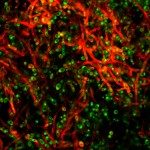Lien vers Pubmed [PMID] – 30760617
mSphere 2019 02;4(1)
The heterozygous diploid genome of is highly plastic, with frequent loss of heterozygosity (LOH) events. In the SC5314 laboratory strain, while LOH events are ubiquitous, a chromosome homozygosis bias is observed for certain chromosomes, whereby only one of the two homologs can occur in the homozygous state. This suggests the occurrence of recessive lethal allele(s) (RLA) preventing large-scale LOH events on these chromosomes from being stably maintained. To verify the presence of an RLA on chromosome 7 (Chr7), we utilized a system that allows (i) DNA double-strand break (DSB) induction on Chr7 by the I-I endonuclease and (ii) detection of the resulting long-range homozygosis. I-I successfully induced a DNA DSB on both Chr7 homologs, generally repaired by gene conversion. Notably, cells homozygous for the right arm of Chr7B were not recovered, confirming the presence of RLA(s) in this region. Genome data mining for RLA candidates identified a premature nonsense-generating single nucleotide polymorphism (SNP) within the HapB allele of C7_03400c whose ortholog encodes the essential Mtr4 RNA helicase. Complementation with a wild-type copy of rescued cells homozygous for the right arm of Chr7B, demonstrating that the RLA is responsible for the Chr7 homozygosis bias in strain SC5314. Furthermore, we observed that the major repeat sequences (MRS) on Chr7 acted as hot spots for interhomolog recombination. Such recombination events provide with increased opportunities to survive DNA DSBs whose repair can lead to homozygosis of recessive lethal or deleterious alleles. This might explain the maintenance of MRS in this species. is a major fungal pathogen, whose mode of reproduction is mainly clonal. Its genome is highly tolerant to rearrangements, in particular loss of heterozygosity events, known to unmask recessive lethal and deleterious alleles in heterozygous diploid organisms such as By combining a site-specific DSB-inducing system and mining genome sequencing data of 182 isolates, we were able to ascribe the chromosome 7 homozygosis bias of the laboratory strain SC5314 to an heterozygous SNP introducing a premature STOP codon in the gene. We have also proposed genome-wide candidates for new recessive lethal alleles. We additionally observed that the major repeat sequences (MRS) on chromosome 7 acted as hot spots for interhomolog recombination. Maintaining MRS in could favor haplotype exchange, of vital importance to LOH events, leading to homozygosis of recessive lethal or deleterious alleles that inevitably accumulate upon clonality.








